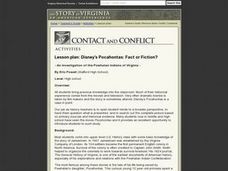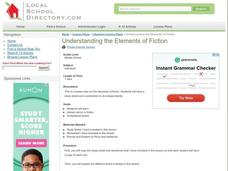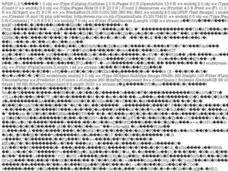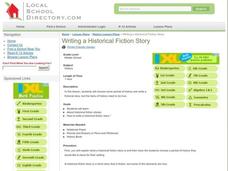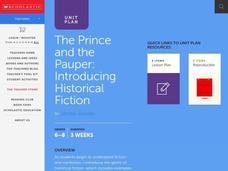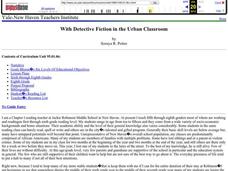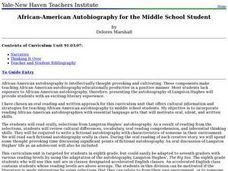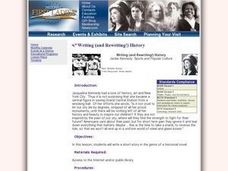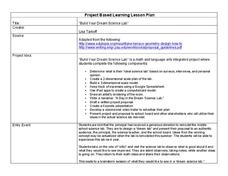Carnegie Library
Creative Writing: Middle School Lesson Plan
Enhance a unit on historical fiction with an engaging writing lesson. Learners bring the Industrial Era to life as they compose their own historical fiction pieces based on primary source images of Pittsburgh steel workers.
Houghton Mifflin Harcourt
Core Analysis Frame: Fiction
Dig into any piece of fiction with a series of analysis questions. There are two levels of questions provided: basic and in-depth. The basic questions can be copied double-sided onto a single piece of paper, while the in-depth questions...
Curated OER
Disney's Pocahontas: Fact or Fiction?
Did you know that Pocahontas was 12 when Jamestown was established? Did you know that she later married John Rolfe? Did you know that she lived in London for two years? Did you know that she died of small pox? Class members study the...
Math Moves U
Collecting and Working with Data
Add to your collection of math resources with this extensive series of data analysis worksheets. Whether your teaching how to use frequency tables and tally charts to collect and organize data, or introducing young mathematicians to pie...
Curated OER
Understanding the Elements of Fiction
Inform your class on the elements of fiction: themes, settings, characters, plots, dialogue, narration, flashback, clues, climax, resolution. They write the definitions of the terms on the worksheet provided.l Tip: Have them write a...
Curated OER
Compare and Contrast Two Books
Help your middle school readers recognize the elements of fiction in two books. After reading and taking notes on the details of the books, they write an essay comparing and contrasting the two books. Use this instructional activity to...
Curated OER
Writing a Historical Fiction Story
What is historical fiction? After explaining the difference to your learners, it's time to give each learner a try! With your support, encourage them to research, plan, and write their own historical fiction story. Don't forget to have a...
Curated OER
The Prince and the Pauper
Mark Twain, the famous American author, is often studied in the school system. Use "The Prince and the Pauper" to analyze the differences between the text and its video version. This lesson plan includes several culminating project...
Curated OER
What Makes a Novel a Novel?
They always say to write what you know. This approach is used to get middle schoolers prepared to write novels of their own. Using a favorite book as a model, potential novelists respond to prompts that ask about characters, plot, main...
Curated OER
Characterization Lessons for Middle School Students
Students learn characterization by writing about a special person in their life.
Curated OER
With Detective Fiction in the Urban Classroom
This abstract for an instructional unit using three-minute mysteries, stories by Sir Arthur Canon Doyle, and Edgar Allan Poe includes a short history of detective fiction, sample plans, and suggestions for exercises and activities...
Curated OER
Civil War Literature Circle
Historical fiction can be a valuable asset when learning about the past. Integrate several novels written about the Civil War into your social studies unit, with groups of four working collaboratively to comprehend the novel from...
Curated OER
African-American Autobiography for the Middle School Student
Students are introduced to the characteristics of an autobiography. For each author, they research their life and works and discuss why it reflects different time periods of African-Americans. In groups, they brainstorm characteristics...
Curated OER
Understand the Difference Between Fiction and Non-Fiction
In this fiction and non-fiction worksheet, students cut out 9 sentence strips, read them, and classify each of them as fact or fiction.
Curated OER
Fiction vs. Nonfiction
Learners explore fiction and nonfiction writing. They identify the elements of fiction in a short story and identify the criteria necessary in a nonfiction piece. Students distinguish the author's purpose in an expository text,...
Curated OER
School Autobiography
Students brainstorm for fifteen minutes independently, sketching out what they remember or how they want to organize their data. they write a journal along the lines of "what do you remember about kindergarten? Write to a (fictional)...
Howard Hughes Medical Institute
Living Dinosaurs: Fact or Fiction?
Are birds descendants of dinosaurs? Learners consider the question as they watch an informative video comparing fossil records of dinosaurs with current species. Following the video, groups ponder the evidence to draw conclusions about...
Curated OER
Irony in Poetry and Prose (Fiction and Non-fiction Texts)
Middle and high schoolers examine the impact of irony in poetry and prose. In this figurative language lesson plan, they read instructor-selected literature and identify uses of irony. Then they discuss how irony enhances literature.
Teachers.net
How to Write a Movie Review from a Pet's Perspective
When would two paws up denote a blockbuster film in your classroom? Only when young writers create movie reviews from a pet's perspective in this imaginative expository writing practice. This engaging topic begins with a class discussion...
National First Ladies' Library
Writing (and Rewriting!) History
Middle schoolers differentiate between fiction and non-fiction, discuss historical fiction, which combines both genres, choose historical novel from list and read independently, and write original short stories that combine elements of...
Curated OER
What's Really True? Discovering the Fact and Fiction of Autism
Youngsters investigate autism and autism spectrum disorders. They access a variety of websites which present information on ASD's, and assess how accurate the information they've read actually is. They work in groups and utilize...
Dream of a Nation
Creating Awareness through Action Oriented Writing and Research
Middle schoolers aren't too young to feel strongly about politics, social issues, consumer rights, or environmental problems. Demonstrate the first steps toward social change with a project about action-oriented writing. Eighth graders...
Curated OER
Build Your Dream Science Lab
Would your ideal science lab be filled with bubbling beakers and zapping Tesla coils? Or would it contain state-of-the-art computer technology and data analysis? Dream big with an innovative lesson that connects math and language arts...
Curated OER
Summer of the Monkeys
While reading the book Summer of the Monkeys by Wilson Rawls, the class ties together the core reading objectives, which are making predictions, comprehending new information, reading for author's purpose, independence in reading, and...




